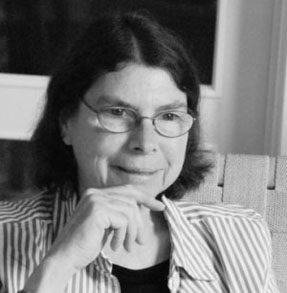Part two of Iris Cushing’s interview of Inger Christensen’s translator. Read part one and an excerpt from alphabet.
Iris Cushing: What has it been like to live with alphabet for over 30 years?
Susanna Nied: Not a day goes by without something from alphabet coming into my mind: a poem, a phrase, an image, an arc; sometimes in Danish, sometimes in English, sometimes beyond language. Of course this is partly because Inger Christensen’s poetry is phenomenal— but also because alphabet‘s themes, its focus on the natural world, and even many of its specific images, were already there at my core from the time I was quite young. Judging by the response alphabet has received, I suspect that many people, disparities aside, connect with it in that way. Part of Inger’s gift is this uncanny ability to be simultaneously specific and universal. It marks all six of her poetry volumes, despite their significant differences.
In my own case, I’m the kind of person who has to stick her nose into every flower; stare and stare at every plant, bug, bird, animal; know the names, relationships, interconnections. So alphabet had me hooked with that first apricot tree. I share Inger’s fascination, though not her depth of expertise, with theories of language history and language development, and with the way that words carry traces wider ranging and older than we know. Though at some level, I think, we do know. And of course, Inger and I were both part of the first generation to grow up under the threat of nuclear war: she from the time she was ten years old, I from birth. The Cold War years were, as Inger once said, “very cold indeed.” There was not only a sense of impending nuclear holocaust, but also this inexorable proliferation of nuclear pollution and other lethal pollution. I grieved for the inevitable losses. I still grieve for them. Against the backdrop of all that, alphabet spoke directly to me from the moment I opened it, and it continues to speak to me.
One reader wrote, ‘thank you for giving the world back to me.’
IC: Can you say something about alphabet’s impact on you as a translator?
SN: Translating alphabet was an early peak experience, one of the great pleasures of my life. It certainly clinched what would become my lifelong addiction to translation.
It was a little strange to feel this strong personal satisfaction with the translation, and yet to have the manuscript rejected by publisher after publisher. Twenty years went by between translation and publication. I got pretty discouraged. I knew nothing in those days about the financial realities that U.S. publishers live with. Now that I do know, I’m grateful beyond words to New Directions for bringing out not only alphabet, but all five of Inger’s other volumes of poetry as well. Publishers do not make profits from poetry. They especially do not make profits from poetry in translation. I thank my stars for this gutsy, small, independent house, New Directions, and for the dedicated people at its helm.
The fact that alphabet worked out well in English, in terms of form, was partly luck. English and Danish are both Germanic languages, and the family relationships in their vocabularies made it possible for me to approximate alphabet‘s original patterns of alliteration, internal half-rhymes, and unusual on-again, off-again meters. Read full article
